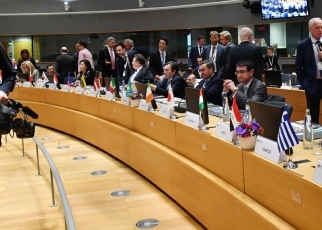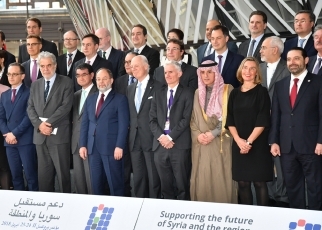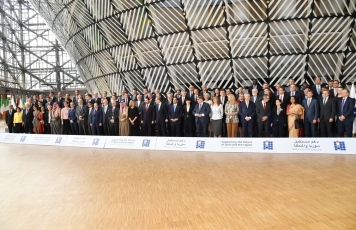Japan-Syria Relations
Supporting the future of Syria and the region, Brussels II Conference, 2018



Taro Kono, Minister for Foreign Affairs of Japan, attended “Supporting the future of Syria and the region, Brussels II Conference, 2018” in Brussels, Belgium, on 25th of April, hosted jointly by the EU and the United Nations.
1.Background
The crisis in Syria entered its eighth year in March 2018. The Conference aims to (1) reaffirm the support of the international community for a political solution to the Syrian crisis led by the United Nations, (2) hold consultations about improving conditions for international humanitarian aid, (3) ensure ongoing support by the international community, at a time when growing political and military tensions in Syria cause enormous harm to the citizens. The Conference is the sixth donor conference on support of Syria, following the three hosted by Kuwait from 2013 to 2015, the London Conference in 2016, and the first Brussels Conference that was held in 2017 (Brussels I Conference).
2.Overview
(1) The Conference brought together representatives of 86 countries and institutions, and civil society and humanitarian development organizations, including Prime Minister level representations such as Mr. Saad al-Hariri, Prime Minister of Lebanon and Dr. Recep Akdag, the Deputy Prime Minister of Turkey, and a number of ministerial level figures from such as Germany, Hungary, Norway, Jordan, Saudi Arabia, Iraq, Qatar and Iran, as well as international or regional represented by Mr. Staffan de Mistura, the UN Special Envoy to Syria, Mr. Mark Lowcock, the UN Under-Secretary-General for Humanitarian Affairs and Emergency Relief Coordinator and Ms. Federica Mogherini, the High Representative of the European Union for Foreign Affairs and Security Policy. As for the United States and Russia, Assistant Secretary of State for Near East Affairs of the US Department of State and Permanent Representative of Russia to the EU participated in the Conference.(List of the participants) (PDF)
(2) In the Conference, participants reviewed progress in the commitments taken by the participants at the Brussels I Conference in 2017, and announced new pledges including this year or multi-year pledges. A total of the new pledges were approximately 7.8 billion USD (4.4 billion USD for 2018, and 3.4 billion USD for 2019-2020). In addition, international monetary institutions and donors announced a total of 2.1 billion USD in grants.
(3) Minister Kono made a speech as the representative of the Government of Japan. In his speech, concerning reports about the use of chemical weapons in Eastern Ghouta this month, Minister Kono strongly condemned the use of chemical weapons, and emphasized it was indispensable to establish an international mechanism to identify those responsible for the use of chemical weapons. He said Japan has already provided about 220 million USD of additional humanitarian assistance this year to respond to the new needs of Raqqa and other areas liberated from ISIL, and thus Japan’s assistance to Syria and neighbouring countries has exceeded 2.2 billion USD in total since 2011. Furthermore, he said Japan decided on April 24th to provide new assistance worth 14 million USD including assistance to inside Syria such as the deteriorating Eastern Ghouta, assistance to refugees in Jordan and Lebanon in areas such as food and health, and assistance to UNRWA facing a severe financial situation. Finally, he emphasized that, since he took office as the Foreign Minister last August, he has made a strong commitment to the Middle East as one of the pillars of his foreign policy, and therefore Japan remained committed to playing a responsible role for the stability of Syria in both the humanitarian and political spheres, in order to help all Syrians foster aspirations for the future, suggesting the needs to create some kind of international taxation to raise enough money to help the support for refugees and IDPs. The Japanese commitments were appreciated by participants in the Conference (Minister Kono’s Speech (PDF) ). Japan’s new assistance in 2018 was ranked 6th after Germany (1,02 billion USD ), EU(691 million USD), UK (634 million USD), Canada (313 million USD), Norway (287 million USD) (List of new pledges (PDF)
). Japan’s new assistance in 2018 was ranked 6th after Germany (1,02 billion USD ), EU(691 million USD), UK (634 million USD), Canada (313 million USD), Norway (287 million USD) (List of new pledges (PDF) ).
).
3.Evaluation
(1) In response to reports about the large number casualties resulting from the use of chemical weapons in Eastern Ghouta (Duma) in Syria, most participants emphasized the use of chemical weapons was not justified by any reasons.
(2) The Conference emphasized the importance of a political solution based on United Nations Security Council resolution 2254 and other related Security Council resolutions and the Geneva Communiqué to solve the Syrian crisis, that is, the Intra-Syrian talks brokered by the United Nations in Geneva, and announced its support to the talks.
(3) Furthermore, many of the conference attendees pointed out the necessity of continuous support to the neighbouring countries bearing a heavy burden by hosting Syrian refugees, and emphasized the importance of safe, sustained and unimpeded access of humanitarian aid throughout the whole territory of Syria.
4.Others
Minister Kono paid a courtesy call on Mr.Saad Hariri, Prime Minister, the Republic of Lebanon and held bilateral meetings with his counterparts including Mr. Ayman Safadi, Minister of Foreign Affairs and Expatriates of the Hashemite Kingdom of Jordan, Dr. Mohammad Javad Zarif, Minister of Foreign Affairs of Iran, Ms. Federica Mogherini, the High Representative of the European Union for Foreign Affairs and Security Policy, and Dr. Cecilia Malmström, European Commissioner for Trade, on the sidelines of the Conference to discuss such matters as the situations in Middle East and East Asia. He also spoke with other participants in the Conference, including Linas Linkevicius, Minister of Foreign Affairs of Lithuania.

